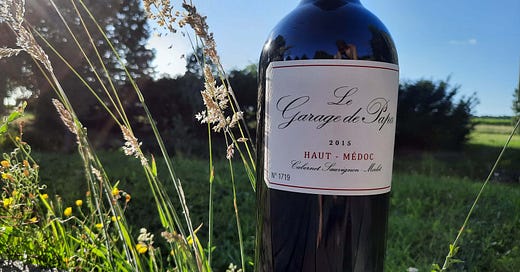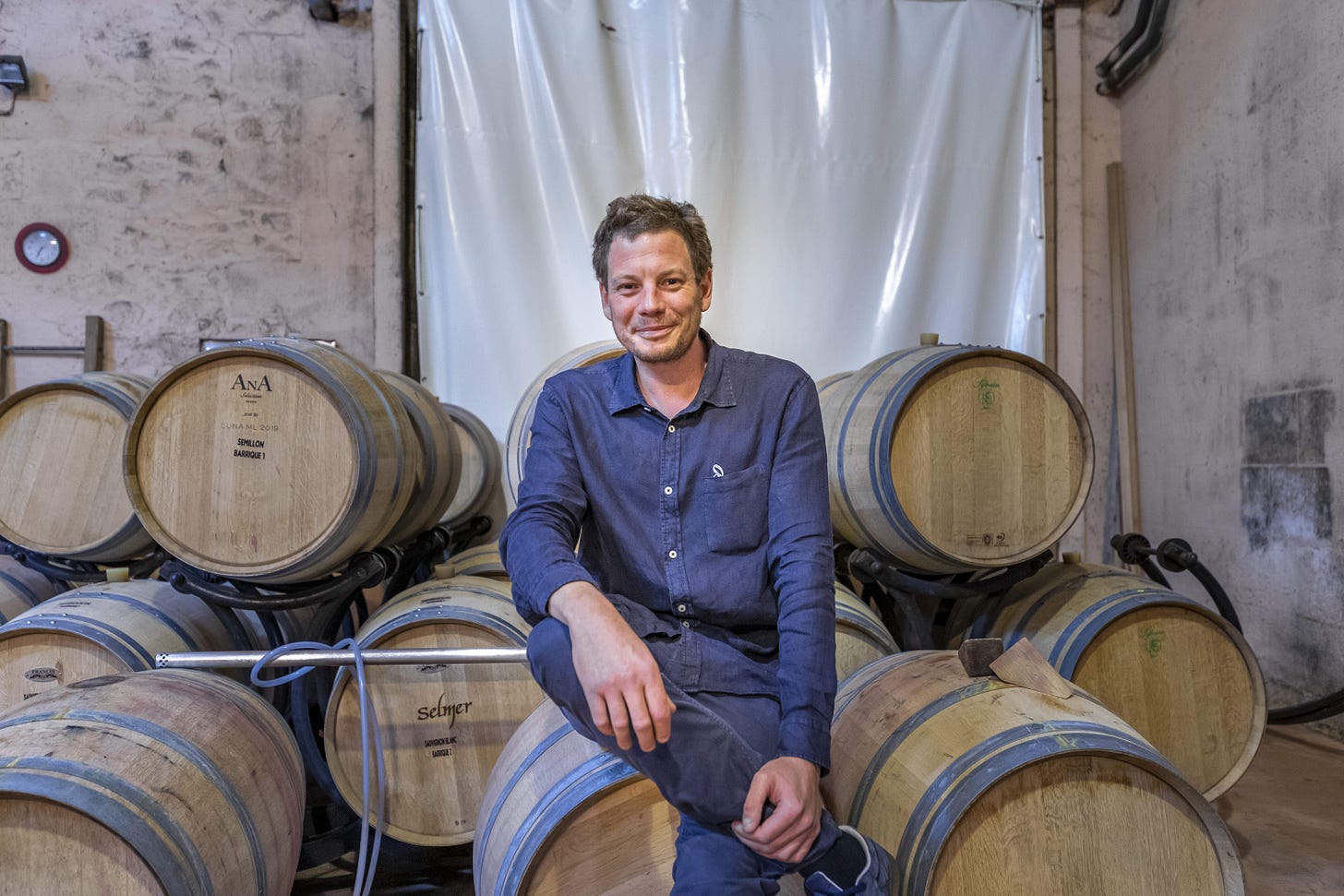Le Garage de Papa: a garage wine that rocks
I knew garage rock: guitars, drums, a strong distortion, a dirty sound, a confidential public.
Now I discover garage wine. What´s that?
The concept of garage wine was born in 1979 thanks to the work of Jacques Thienpont at Château Le Pin in Pomerol (Bordeaux) with his excellent quality wines produced from his 2.7 hectares of Merlot grape. In the 90's, the concept get traction with a wine produced at Château de Valandraud on 0.6 hectare in Saint-Émilion. Coined « garage wines » in the press at the time, these drops are characterized by very low volumes (less than 7000 bottles) and a great care given to the vine. The vines are cultivated on a small surface and are severely pruned and thinned out to limit the yield of grappe. A meticulous vinification is then be carried out. Aged in oak barrels and at the time highly rated by the famous (yet highly criticized in France) Robert Parker, these wines quickly attracted attention and their price skyrocketed, which meant that these bottles were reserved for a small number of people.
Dad, get your car out of the garage, I want to make some wine
The Romanée Conti corresponds to the above mentionned criteria of a "garage wine": a small plot of vines (1,8 ha), a low yield (25 hl/ha), lots of care, small batches (5,000 - 6,000 bottles per year). The only problem is that the price of the bottles of this world famous wine makes you want to cry.
But the situation is changing. Some "garage wine"are becoming affordable for everyone. Le Garage de Papa (Dad´s Garage) is a good example. Made from a blend of Merlot (30%) and Cabernet-Sauvignon (70%) from old vines growing on gravelly soil in the Haut-Medoc (Bordeaux region), this cuvée (batch) produced by Pierre Raoux is limited to 5000 bottles. After a hand harvest, part of this wine was vinified in new oak barrels. The vinification of the grapes in stainless steel tanks began after 10 days of cold maceration. 80% of the volume was aged in new barrels and the rest in one year old barrels. The 2014 and 2015 vintages, ready to be tasted, are already on the market and the 2016 vintage will be released in 3 months.
That's all well and good, but what about the taste?
I'm a big advocate of food and wine pairings. So to go with this wine, we decided to cook something. It's a Cabernet Sauvignon-dominant Bordeaux, so we needed a dish that would make the cut. We opted for roulades in sauce with tagliatelles. The roulade is not a French dish but a German one. Vaguely similar to paupiette, roulade consists of a long, thin slice of beef rolled up with onions and spices. In our family, this dish is normally reserved for Christmas time, but rules are made to be broken (yeah, the good old garage rock spirit).
Le Garage de Papa has a beautiful ruby color: a deep, intense purple red that plays with the light. On the nose, the smell of blackcurrant dominates the aromatic picture, but patient winelovers may be able to recognize scents of pear and honey, well hidden behind the little black berry. On the taste, the alcohol and acidity are well balanced. Black fruits dominate but a touch of licorice appears to enrich the taste palette. The finish is pleasant, with present but not aggressive tannins. The years of aging have done their work. The wine-dish tandem works perfectly, each one being able to complement the other.
Plan to decant for about an hour.
Another good point: the price is affordable, about 27 € in France, which makes it an excellent value for money wine.
Hopefully the garage wine concept will grow. The emphasis on quality, whether in the vineyard, winemaking or aging, is more than welcome. This trend meets a real demand from wine lovers.
Santé !
Interview with the father of Le Garage de Papa
Pierre Raoux, the producer of this wine, was kind enough to answer a few questions :
FV: Pierre Raoux, can you briefly introduce yourself?
PR: I was born in Bordeaux and I am 37 years old. I belong to the 5th generation of a winegrower and wine merchant family. My grandfather was the leader in mail order wine sales in France in the 1980s (Chamvermeil). My family acquired Chateau d'Arsac when I was 1, in 1986, which has become over time a recognized property in Margaux and since 2020 Cru Bourgeois Exceptionnel. I have traveled a lot (2 years in China, 5 years in Australia) and I love wines from all over the world. I finished my studies in Australia with a Master in wine in Melbourne and I fell in love with this country where I stayed for several years. When I came back and with my experience in China, I created my own wine merchant company to offer quality wines at a reasonable price with a focus on Cru Bourgeois. Since the crisis, I have focused on a more local (and more serene) distribution.
FV: What led you to produce a garage wine?
PR: Several reasons led me to make a garage wine that is put on the market when it is ready to drink, at the moment of its optimal age. Who today can buy a Grand Cru Classé without breaking the bank? Should we keep our bottles without knowing what tomorrow will bring? Le Garage de Papa answers these two problems: a wine ready to drink at the top of its maturity (wines must be drunk), for less than thirty euros. You can enjoy a fine and elegant wine, typical of the appellation, without spending crazy amounts of money. Moreover, the 5000 bottles are numbered. Garage wines are rare in the Médoc because of the size of the properties and the production costs. I wanted to take up this challenge. I also observed the evolution of the consumers since the last decades: they consumes less wine, but of better quality. I am just adapting to the needs and demands of the 21st century wine consumer with a real concept and quality wine: a rare drop with good value for money and ready to drink (good for the consumer and the economy in general)
FV: In your opinion, what challenges does the wine industry currently face?
PR: It is necessary to adapt to consumers, to meet their expectations (in terms of typicity of wines and packaging). It is also essential to evolve with consumers and not to stick to our habits in Bordeaux. We must make wine more sexy and more attractive to the younger generation. In my opinion, wine remains a cultural product in France, a condiment at mealtime, a must-have. The taster Yves Beck has understood this well: impartial, he rates the wines according to the typicity of the terroir and the expectations of the consumer in general, and not according to his own opinion as was once the case with Parker... The expression of the terroir: that´s the point.
FV: Thank you Pierre for this very informative interview.
More infos:
raoux.pierre@gmail.com



